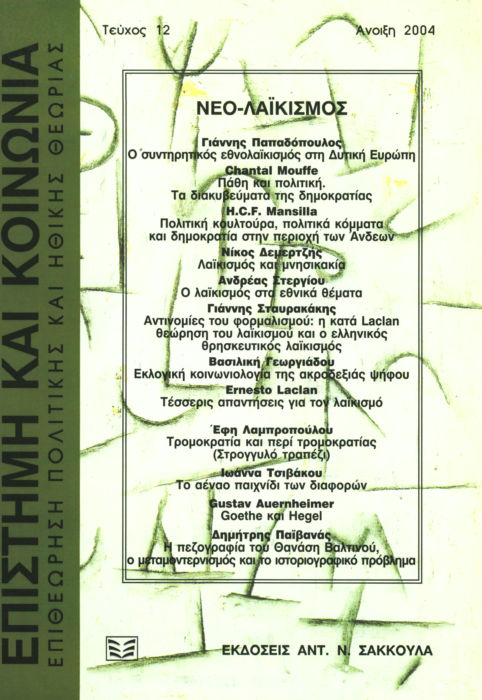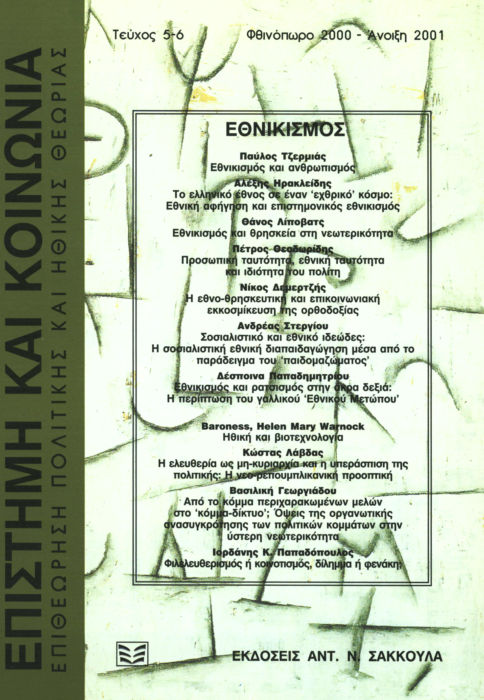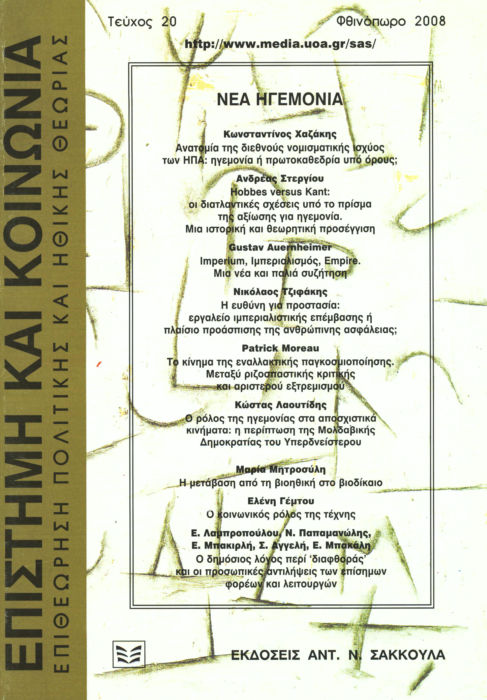Ο λαϊκισμός στα εθνικά θέματα
Περίληψη
Ο όρος λαϊκισμός, που παρεισέφρησε στο ελληνικό πολιτικό λεξιλόγιο με ιδιαίτερη έμφαση από τη δεκαετία του 1980 και μετά, στοιχειοθετείται σε μεγάλο βαθμό και από τις αντιλήψεις που εμφορούνται από αυτόν γύρω από τα εθνικά θέματα. Το εννοιολογικά ιδιαίτερα θολό πεδίο αυτό ανάδειξης λαϊκιστικού λόγου και νοοτροπίας συνδέθηκε πολύ γρήγορα με σκληροπυρηνικές απόψεις για τη στάση της χώρας στις σχέσεις με τους γείτονές της, τους συμμάχους της και ορισμένα άλλα βασικά εθνικά ζητήματα που την ταλανίζουν για δεκαετίες. Μετά από μια σειρά πολιτικών μεταβολών, που συντελέστηκαν στη δεκαετία του 1990, ο λαϊκισμός έγινε στο πλαίσιο αυτό συνώνυμο του αντιευρωπαϊ- σμού και του αντιδυτικισμού προβαλλόμενος από τα MME, ακούσια ή εκούσια, ως αντίπαλο δέος στον ανατέλλοντα ‘εκσυγχρονισμό’. Το γεγονός αυτό παρεμπόδισε μια ουσιαστική αντιπαράθεση επί της ουσίας προσφέροντας άλλοθι στο ‘εκσυγχρονιστικό ρεύμα’ και σε διάφορους ευρωπαϊστές διανοούμενους για ανάπτυξη απόψεων οι οποίες δεν ήταν πάντοτε ενδεικτικές του ορθολογισμού που καλούνταν να υπηρετήσουν.
Οι διεθνείς εξελίξεις των τελευταίων χρόνων και ο αντίκτυπος τους στην ελληνική κοινή γνώμη αφύπνισε τα εθνικά αντανακλαστικά τόσο της θεσμοθετημένης Αριστερός, όσο και πολλών αριστερών διανοουμένων που είχαν φθαρεί από έναν ολοένα και πιο αποστειρωμένο αντιευρωπαϊσμό της δεκαετίας του 1980 και την κατάρρευση του επί δεκαετίες διαφημιζόμενου δυνητικού συμμάχου της Ελλάδας, του ανατολικού συνασπισμού. Στο νέο διεθνοποιημένο πολιτικό και οικονομικό πλαίσιο, η επίκληση του διεθνισμού που προσδιόριζε τον μέχρι τότε αριστερότροπο πολιτικό λόγο, κατέστη ανεπίκαιρη. Η νέα πολιτική στρατηγική προσέγγισης των ‘λαϊκών’ στρωμάτων, όσων δηλαδή ένιωσαν παραγκωνισμένοι στον νέο μεταβαλλόμενο κόσμο, επέβαλε αναπροσδιορισμό της μέχρι τότε διεθνιστικής προσέγγισης του ρόλου του έθνους. Η νέα αυτή στρατηγική της Αριστερός αποδείχτηκε ιδιαίτερα επιτυχημένη καθώς, οι διαρκείς επεμβάσεις των Αμερικανών και του ΝΑΤΟ σε διάφορες χώρες, προσέφεραν το αναγκαίο έδαφος για τη δυναμική επανεμφάνισή της στο πολιτικό γίγνεσθαι της χώρας, χαρίζοντάς της ένα πολύ μεγαλύτερο κοινό και πολύ περισσότερους συνοδοιπόρους από την πραγματική της δύναμη. Η επιτυχία αυτή, ωστόσο, απαίτησε ένα μεγάλο ιδεολογικό τίμημα.
Λεπτομέρειες άρθρου
- Πώς να δημιουργήσετε Αναφορές
-
Στεργίου Α. (2015). Ο λαϊκισμός στα εθνικά θέματα. Επιστήμη και Κοινωνία: Επιθεώρηση Πολιτικής και Ηθικής Θεωρίας, 12, 115–147. https://doi.org/10.12681/sas.769
- Ενότητα
- Άρθρα

Αυτή η εργασία είναι αδειοδοτημένη υπό το CC Αναφορά Δημιουργού – Μη Εμπορική Χρήση – Παρόμοια Διανομή 4.0.
Οι Συγγραφείς που δημοσιεύουν εργασίες τους σε αυτό το περιοδικό συμφωνούν στους παρακάτω όρους:- Οι Συγγραφείς διατηρούν τα Πνευματικά Δικαιώματα και χορηγούν στο περιοδικό το δικαίωμα της πρώτης δημοσίευσης ενώ ταυτόχρονα τα πνευματικά δικαιώματα της εργασίας προστατεύονται σύμφωνα με την άδεια Creative Commons Αναφορά Δημιουργού - Μη Εμπορική Χρήση - Παρόμοια Διανομή 4.0 Διεθνές , που επιτρέπει σε τρίτους - αποδέκτες της άδειας να χρησιμοποιούν την εργασία όχι για εμπορικούς σκοπούς, με την προϋπόθεση της διατήρησης των διατυπώσεων που προβλέπονται στην άδεια σχετικά με την αναφορά στον αρχικό δημιουργό και την αρχική δημοσίευση σε αυτό το περιοδικό και με διανομή τυχόν τροποποιήσεων υπό την ίδια άδεια όπως και το πρωτότυπο.
- Οι Συγγραφείς μπορούν να συνάπτουν ξεχωριστές, και πρόσθετες συμβάσεις και συμφωνίες για την μη αποκλειστική διανομή της εργασίας όπως δημοσιεύτηκε στο περιοδικό αυτό (π.χ. κατάθεση σε ένα ακαδημαϊκό καταθετήριο ή δημοσίευση σε ένα βιβλίο), με την προϋπόθεση της αναγνώρισης και την αναφοράς της πρώτης δημοσίευσης σε αυτό το περιοδικό.
- Το περιοδικό επιτρέπει και ενθαρρύνει τους Συγγραφείς να καταθέτουν τις εργασίες τους μέσω διαδικτύου (π.χ. σε ένα ακαδημαϊκό καταθετήριο ή στους προσωπικές τους ιστοσελίδες) πριν και μετά από τις διαδικασίες της δημοσίευσης, καθώς αυτό μπορεί να οδηγήσει σε παραγωγική ανταλλαγή ιδεών και σκέψεων καθώς επίσης και σε γρηγορότερη και μεγαλύτερη χρήση και ευρετηρίαση της δημοσιευμένης εργασίας (See The Effect of Open Access).





